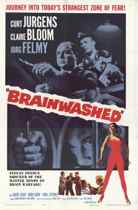 [vc_widget_sidebar sidebar_id=”sidebar-sidebar-reviews”]
[vc_widget_sidebar sidebar_id=”sidebar-sidebar-reviews”]
Brainwashed
German, 1960
Director:
Starring: Directed by Gerd Oswald
Reviewer:
Genre: Non Asian Movie Reviews
Rating:
Starring: Curt Jurgens, Claire Bloom
103 minutes
Reviewed by Jeremy Silman
Rating (a 1 6 scale): 4.5


The movie starts with a middle-aged, aristocratic Austrian man (Werner Von Basil, played by the great Curt Jurgens) being helped on board a ship (it was delayed due to his late arrival, much to the dismay of the other passengers) thats packed with men and women trying to get out of war torn Europe. Once on board, he spies an exhibition where an egotistical, boorish Yugoslav man named Czentovic (who happens to be the World Chess Champion!) is playing one game against several opponents at once, all of them being able to discuss possible moves at length and leisure.After watching a bit of this contest (won by the champion), Werner von Basil retires to his room in a state of turmoil. Its clear that chess was the catalyst, but why? Later he takes a walk and finds the champion involved in a second game against the same, overmatched, group. Seeing that a blunder is about to be played which will result in a quick victory for Czentovic, Werner intrudes and shows the group a way to force a draw. Impressed, they go along with his recommendation and, as promised, save the game.


Back on the ship, we now understand that hes escaped from a mental hospital, and that hes never played a real game of chess against a real person in his life. How does he fare in his contest against the World Champion? The movies answer gives us real food for thought.The director, Gerd Oswald, was the son of celebrated German stage and film director Richard Oswald. Gerd ultimately helmed many movies, did the first season Star Trek episode The Conscience Of The King, and directed several episodes of The Outer Limits from 1963 to 1964. However, Brainwashed stands out as his most compelling work.
